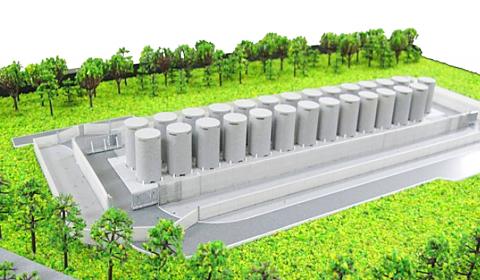Citing concerns over security measures, the New Taipei City Government yesterday said it is holding on to Taiwan Power Co’s (Taipower, 台電) application to build a dry-storage facility to store spent fuel rods from nuclear power plants.
According to a report published yesterday in the Chinese-language Apple Daily, Taipower’s application to set up a dry-storage facility for spent fuel rods from the Jinshan Nuclear Power Plant in New Taipei City’s Shihmen District (石門) and the Guosheng Nuclear Power Plant in the city’s Wanli District (萬里) faces further scrutiny.
The city government said that there could be no nuclear power without nuclear safety, the report said, adding that the city government has returned the application’s environmental conservation reports on concerns over security and the facility’s resistance to seismic activity.

Photo: Courtesy of the Atomic Energy Council
However, the Council of Agriculture (COA) recently approved the environmental conservation plans for the facility.
If the application is approved by the Executive Yuan, the facility would commence operations in two years’ time, becoming the nation’s first dry-storage facility.
New Taipei City Government spokesperson Lin Chieh-you (林芥佑) yesterday said the municipality protested using New Taipei City as a location for the storage of nuclear waste.
The municipality’s residents have concerns over their health and safety, and would not support the setting up of a dry-storage facility, Lin said.
Plans for the facility as well as the presence of the power plants themselves have led to safety concerns among residents along the northern coast, New Taipei City Deputy Mayor Hou You-yi (侯友宜) said.
“The city government understands that there is an urgent need for the facility, but there can be no action as long as the safety of our residents cannot be guaranteed,” Hou said.
New Taipei City Deputy Mayor Chen Shen-hsien (陳伸賢) said the city government is in negotiations with the COA for a larger role in the decisionmaking process, adding that no decision by the central government would be acted upon without the local government’s consent.
Meanwhile, Green Citizens’ Action Alliance deputy secretary-general Hung Shen-han (洪申翰) said the attitudes of both the central and local governments highlighted the controversy surrounding the handling of nuclear waste, adding that Taipower should assess the viability of other options and begin negotiations on long-term nuclear waste treatment with the parties concerned.
Additional reporting by CNA

NATIONAL SECURITY THREAT: An official said that Guan Guan’s comments had gone beyond the threshold of free speech, as she advocated for the destruction of the ROC China-born media influencer Guan Guan’s (關關) residency permit has been revoked for repeatedly posting pro-China content that threatens national security, the National Immigration Agency said yesterday. Guan Guan has said many controversial things in her videos posted to Douyin (抖音), including “the red flag will soon be painted all over Taiwan” and “Taiwan is an inseparable part of China,” while expressing hope for expedited “reunification.” The agency received multiple reports alleging that Guan Guan had advocated for armed reunification last year. After investigating, the agency last month issued a notice requiring her to appear and account for her actions. Guan Guan appeared as required,

A Vietnamese migrant worker yesterday won NT$12 million (US$379,627) on a Lunar New Year scratch card in Kaohsiung as part of Taiwan Lottery Co’s (台灣彩券) “NT$12 Million Grand Fortune” (1200萬大吉利) game. The man was the first top-prize winner of the new game launched on Jan. 6 to mark the Lunar New Year. Three Vietnamese migrant workers visited a Taiwan Lottery shop on Xinyue Street in Kaohsiung’s Gangshan District (崗山), a store representative said. The player bought multiple tickets and, after winning nothing, held the final lottery ticket in one hand and rubbed the store’s statue of the Maitreya Buddha’s belly with the other,

‘NATO-PLUS’: ‘Our strategic partners in the Indo-Pacific are facing increasing aggression by the Chinese Communist Party,’ US Representative Rob Wittman said The US House of Representatives on Monday released its version of the Consolidated Appropriations Act, which includes US$1.15 billion to support security cooperation with Taiwan. The omnibus act, covering US$1.2 trillion of spending, allocates US$1 billion for the Taiwan Security Cooperation Initiative, as well as US$150 million for the replacement of defense articles and reimbursement of defense services provided to Taiwan. The fund allocations were based on the US National Defense Authorization Act for fiscal 2026 that was passed by the US Congress last month and authorized up to US$1 billion to the US Defense Security Cooperation Agency in support of the

CLASSIFIED BRIEFING: The ministry said the special budget focuses on building a comprehensive defense system and strengthening the domestic defense industry The Ministry of National Defense yesterday released information on seven categories of weapons systems to be procured under a stalled NT$1.25 trillion (US$39.57 billion) special defense budget, including precision artillery, long-range missiles, air defense anti-tank missiles and more than 200,000 uncrewed aerial vehicles (UAVs). The Executive Yuan approved a draft version of the budget on Nov. 27 last year and submitted it to the legislature for review. The legislature’s Foreign Affairs and National Defense Committee yesterday invited Minister of National Defense Wellington Koo (顧立雄) to deliver a classified briefing and answer questions at a closed-door session. Koo said he hoped to provide lawmakers